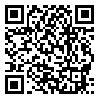BibTeX | RIS | EndNote | Medlars | ProCite | Reference Manager | RefWorks
Send citation to:
URL: http://bcn.iums.ac.ir/article-1-311-en.html

 , Khosro Sadeghniiat-Haghighi2
, Khosro Sadeghniiat-Haghighi2 
 , Shoaib Naimian3
, Shoaib Naimian3 
 , Mohammad Ali Zohal1
, Mohammad Ali Zohal1 
 , Mostafa Ghaniri4
, Mostafa Ghaniri4 

2- Department of Occupational Medicine, Tehran University of Medical Sciences, Tehran, Iran
3- Qazvin University of Medical Sciences, Qazvin, Iran
4- General physician
Introduction: Epilepsy is a complex pervasive neurobehavioral and social condition accompanied by a wide range of comorbid conditions that can adversely affect the quality of life of patients. Sleep complaints are common among patients with epilepsy. The aim of this study was to assess the prevalence of subjective sleep disturbances and its effects on sleep quality in epileptic patients.
Methods: In this cross-sectional study, 152 consecutive epileptic patients and 152 controls were interviewed. We used Epworth Sleepiness Scale, Insomnia Severity Index, Berlin Questionnaire and Pittsburg Sleep Quality Index to measure excessive daytime sleepiness, insomnia, obstructive sleep apnea and sleep quality. R estless leg syndrome was diagnosed using three questions.
Results: The age, gender and average total sleep time was similar in patients and control group. The frequency of excessive sleepiness scale and subjective complaint of sleep maintenance was higher in epileptic patients than control group (P<0.05). The symptoms of restless leg syndrome were reported by 32.3% of patients and 11.8% of controls (P<0.05).
Discussion: Daytime sleepiness, dif.culty in sleep maintenance, poor sleep quality and RLS appear to be common in patients with epilepsy. Further con.rmatory studies are needed using objective sleep studies to detect underlying mechanisms of sleep disorders in these patients.
Received: 2012/12/18 | Accepted: 2013/03/2 | Published: 2013/03/2
| Rights and permissions | |
 |
This work is licensed under a Creative Commons Attribution-NonCommercial 4.0 International License. |



